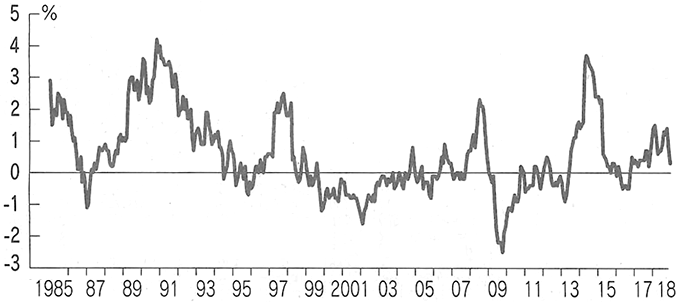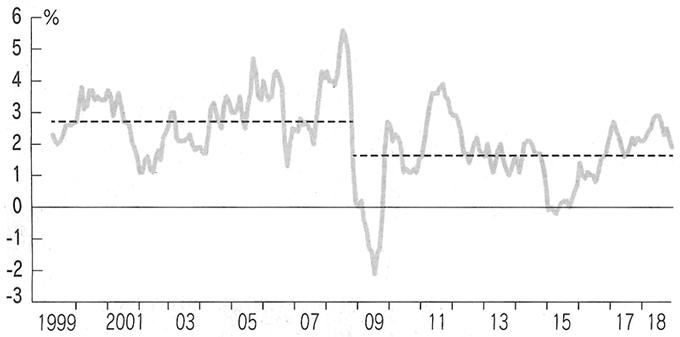Since the global financial crisis in 2008, massive monetary easing and fiscal stimulus packages have been implemented worldwide. Despite this, the trend of low inflation (deflation) in a low interest rate environment has continued. In what follows, I would like to examine the following hypothesis: People's inflationary expectations may be changing in a direction not intended by policymakers.
We should assume that industrialized nations, especially Japan, have fallen into a state of deflationary equilibrium, a phenomenon in which deflation continues over a prolonged period of time under expansionary monetary and fiscal policies. This phenomenon cannot be explained by conventional economic models.
This is because conventional economic theory holds that expansionary monetary and fiscal policies, if continued, will eventually cause inflation, as shown in a 2002 paper by New York University Professor Jess Benhabib and others, as well as in a 2018 paper by Northwestern University Professor Lawrence Christiano and Hitotsubashi University Junior Assistant Professor Takahashi Yuta.
The effectiveness of expansionary policies can be explained as follows. The transversality condition (TVC), which dictates that a rational person will not waste his assets and currencies by leaving them behind at his death, holds in conventional economic models. Broadly put, this means that government debt (including money) will not increase infinitely.
When prices do not rise despite the continuation of expansionary monetary and fiscal policies, the real value of government debt continues to increase (thus violating the TVC). Government debt is an asset to households. A continuous increase in household assets means that household consumption demand will grow to an unlimited extent. Meanwhile, the total supply of consumer goods is finite. This situation would result in an infinite excess of demand over supply, unless prices go up, decreasing demand. Thus, expansionary policies should increase the inflation rate. This is how an expansionary policy as a mechanism for escaping deflation is explained by the conventional economic theory.
All of the deflation-fighting policies prescribed by the Japanese government in the early 2000s were based on this logic, as advocated, for instance, by City University of New York Professor Paul Krugman (1998), former Federal Reserve Board Chairman Ben Bernanke (2000), and Professor Benhabib and others (2002, op. cit.). However, the experiences of Japan, the United States, and Europe over the past decade suggest that this prescription is not working.
(Consumer Price Index)

(Consumer Price Index; the dotted line indicates the average value before and after the financial crisis)

♦ ♦ ♦
In order to understand the phenomenon of sustained deflationary equilibrium, it is necessary to assume that people's preferences are variable, departing from the conventional economic models, in which preferences are assumed to be constant. If people's utility functions are changeable in accordance with environmental changes, it would be possible for people to develop excessive love of money. For the purpose of this article, "love of money" is defined as an "(ungrounded) sense of utility that people feel from holding financial assets such as money and government bonds." This is a type of bubble or illusion.
In general, people see value in financial assets because such assets enable them to consume goods and services in the future. However, in a society where the possession of assets serves as a signal, for instance, of social status, people see social "value" in holding financial assets (University of Pennsylvania Professor Harold Cole and others, 1992). This model provides an example of how social structure affects people's preferences and hence gives rise to excessive love of money.
The model I am currently working on represents the hypothesis that people come to see excessive value in assets, driven by intergenerational expectations, in which people assume that their offspring will be afflicted by the same love of money. Even if you do not find much utility for yourself in holding assets, you are inclined to accumulate excessive assets to leave them for your children as you are altruistic toward your offspring.
When over-inflated love of money arises from desire for social status or from intergenerational expectations, assets (government debt) will accumulate excessively in the economy However large the increase in assets may be, they would not be used to purchase goods and services, causing the assets to accumulate infinitely, hence, the continuation of deflation (i.e., the TVC continues to be violated). This is how sustained deflationary equilibrium occurs. Professor Makoto Saito of Nagoya University also proposed a theory of deflationary equilibrium in his 2019 paper, in which he also assumes that the TVC is temporarily violated. Meanwhile, Professor Yoshiyasu Ono of Osaka University proposed a theory of love of money in his 2001 paper but did not provide any explanation as to why such a phenomenon occurs.
The expansionary policies implemented to overcome deflation were an attempt to achieve inflation by violating the TVC in a deflationary environment. However, contrary to their intentions, these policies may have induced people to behave in such a way as to enable an equilibrium to be established even when the TVC is violated.
♦ ♦ ♦
In other words, it may be that intergenerational expectations changed in response to government policies, giving rise to the over-inflated love of money and resulting in the realization of the deflationary equilibrium that holds even when the TVC is violated.
Under such circumstances, real interest rates settle at a positive value as the market moves toward equilibrium. Thus, the continuation of a zero interest rate policy, which keeps nominal interest rates at zero, will necessarily push the inflation rate into negative territory, according to the Fisher Equation (i.e., inflation rate + real interest rate = nominal interest rate). When interest rates are zero, there is no interest income to depositors, which makes them less inclined to spend, thereby driving prices down. This is the mechanism that gives rise to sustained deflation contrary to the intention of policymakers.
The Neo-Fisherian hypothesis (advocated inter alia by John Cochrane, senior research fellow at the Hoover Institute of Stanford University in his 2017 paper, as well as by Columbia University Professors Stephanie Schmitt-Grohé and Martín Uribe in their 2017 paper) assumes that a zero-interest-rate policy begets deflation. This, however, has not been taken seriously by central banks due to the fact that economists and policymakers widely share the belief that the TVC always holds at equilibrium.
However, where the utility function is subject to some sort of a bubble, the TVC could be violated even at equilibrium. In that case, there is no denying the logic that a zero-interest-rate policy begets deflation. The image of an economy in which the utility function of people varies flexibly may challenge the conventional wisdom that an economy is regarded as a predictable mechanical system.
It would not be surprising at all if the end of a prolonged deflation followed by a sudden burst of the love of money bubble triggered an unpredictable episode of hyperinflation. Furthermore, the mechanism in which intergenerational expectations give rise to a utility bubble may be related to the formation of beliefs and moral values embraced by people. When people believe there is value in a certain idea, their expectation that future generations will see the same value is what supports their belief.
This presumption is irrefutable because the current generation cannot verify the truth of their expectations regarding the next generation. Therefore, there is no dismissing the expectation as being irrational. Meanwhile, because the fact that they share that value is the reason that they expect their offspring to share the same value.
Circular reasoning related to intergenerational expectations reinforces people's thoughts and beliefs, which serve to create bubbles in the utility function. Thinking this way, I cannot help but wonder how human-like, unpredictable, and tricky the economy can be.
* Translated by RIETI.
June 12, 2019 Nihon Keizai Shimbun


